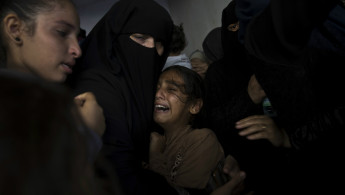Thousands bury 11-year-old, 2 others killed by Israeli fire in Gaza
Thousands attended funerals of three Palestinians killed by Israeli army fire in a protest at the border fence a day earlier, including an 11-year-old, a 17-year-old and a man on crutches.
More than 140 Palestinians, most of them unarmed, have been killed and several thousand wounded by Israeli troops since March in such protests, in part led by Hamas, Gaza's Islamist rulers.
The Gaza Health Ministry said the latest deaths brought to 18 the number of minors, age 18 and under, killed in the past four months.
Human rights groups have accused Israel of the unlawful use of lethal force against the protesters, most of whom were unarmed and include journalists, health workers, and bystanders.
Gaza's Health Ministry said on Saturday that Moumin al-Hams, 17, was shot in the chest in the protest on Friday along the fence that separates Gaza and Israel.
Images shared on social media by his friends and relatives show him venturing toward the fence, setting tires ablaze and pushing them toward Israeli forces.
Funerals were also held Saturday for Majdi al-Satari (left), 11, whose age was previously announced as 14, and for Ghazi Abu Mustafa, 43.
Twitter Post
|
The Health Ministry initially gave Majdi's age as 14. On Saturday, it said his age was 12. A relative said the boy had been born Octobert 3, 2006, meaning he was 11 when he was killed. Al-Mezan, a Gaza-based rights groups, confirmed Majdi's age as 11.
Alaa Abdel-Fattah, a witness, said that on Friday protesters were trying to cut razor wire about 50 yards away from the actual fence. He said Majdi was watching from about 100 metres away. "There were two gunshots from a sniper. One hit one of those cutting the wire in the leg and the other gunshot hit the boy in his head," he said.
Women gathered under the corrugated zinc roofing of the al-Satari's family's house for the funeral.
Majdi's mother, Kholoud, wearing a black robe and face veil, sat on a mattress.
"I don't know what he did to them [the Israeli soldiers]," she said as she burst in tears. She added that his family tried to prevent him from going to the protests and on one occasion tried to lock him indoors. "It's his fate," she sighed.
"He is a child. He had no bullets or weapons," said the boy's grandmother, identified as Umm Ramzi. "He was standing like all children watching. They shot him from afar. Isn't he a child? Why are they targeting children?"
In a nearby town, resident Hassan Najjar said he witnessed the shooting of 43-year-old Abu Mustafa.
He said soldiers shot at a group of Palestinians who rushed to the border and a bullet hit the man sitting about 250 metres away. He said the man had sustained leg wounds at a previous protest and was still using crutches.
Read more: Without Israel's blockade, Gaza would flourish
Hamas has led border protests aimed in part at drawing attention to the Israeli-Egyptian blockade imposed after Hamas took control of Gaza in 2007.
The demonstrations have been fueled in large part by pervasive despair caused by the blockade which has caused widespread economic hardship.
Last week a Palestinian sniper killed an Israeli soldier. Another soldier was wounded by Palestinian fire on Wednesday.
Prime Minister Netanyahu is reportedly working on a deal to implement measures to alleviate some of the humanitarian and economic suffering in Gaza, yet it is unknown what the measures consist of.





 Follow the Middle East's top stories in English at The New Arab on Google News
Follow the Middle East's top stories in English at The New Arab on Google News
![Israeli forces ordered bombed Gaza's Jabalia, ordering residents to leave [Getty]](/sites/default/files/styles/image_330x185/public/2176418030.jpeg?h=a5f2f23a&itok=_YGZaP1z)

